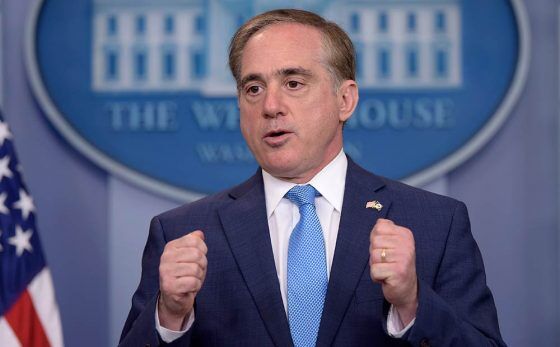
The Department of Veterans Affairs says it will not conduct research into whether medical marijuana could help veterans suffering from post-traumatic stress disorder and chronic pain, as veterans groups are pushing for the use of the drug as an alternative to opioids and anti-depressants.
In a letter to U.S. Rep. Tim Walz (D-Minn.), Department of Veterans Affairs Secretary David Shulkin said VA’s ability to research medical marijuana is hampered by the fact that the drug is illegal federally. Shulkin’s letter came in response to an inquiry by 10 Democrats on the House Veterans’ Affairs Committee. The letter asked Shulkin to commit the VA to investigating whether medical marijuana can help veterans suffering from PTSD and chronic pain and identify barriers to doing so.
Related: Veterans and access to cannabis: 2017 in review
“VA is committed to researching and developing effective ways to help Veterans cope with post-traumatic stress disorder and chronic pain conditions,” Shulkin wrote in a response to the members of Congress. “However, federal law restricts VA’s ability to conduct research involving medical marijuana, or to refer veterans to such projects.”
The response comes as at least 29 states, plus the District of Columbia, Guam and Puerto Rico, have legalized the use of medical marijuana in some form. Veterans groups, including the American Legion, have been pushing for the drug to be studied and used to help ease the effects of PTSD, chronic pain and other disorders.
“What America’s veterans need prioritized right now is for cannabis to be treated as a health policy issue,” said Nick Etten, founder and executive director of the Veterans Cannabis Project. “We’re desperate for solutions for the conditions we’re dealing with.”
According to a 2017 VA review, about 15 percent of veterans treated at outpatient PTSD clinics reported using marijuana in the previous six months. According to “>an American Legion phone survey released in November, 22 percent of veteran household respondents said they used cannabis to treat a medical condition. Ninety-two percent of veteran households surveyed for the Legion said they support researching whether marijuana can effectively treat mental and physical conditions and 82 percent said they want to have medical cannabis as a legal treatment option.
Last month the Veterans Health Administration urged patients to discuss medical marijuana use with their doctors. The shift will allow doctors and patients to determine what, if any, effect marijuana use might have on treatment plans. Veterans were earlier concerned that admitting to marijuana use could jeopardize their benefits. But VA physicians still cannot refer patients to state medical marijuana programs because of the federal prohibition.
John Hudak, deputy director of the Center for Effective Public Management at the Brookings Institution, said even though marijuana is illegal federally, research on the drug is not prohibited.
“Obviously it is federally illegal, but there are no restrictions on doing scientific research on it. Universities do this all the time and there’s a process to go through,” he said, noting that the National Institute on Drug Abuse funds cannabis research. “It’s really a cop out for the VA to say, ‘oh, we’re not doing work on this because of federal law’ when actually federal law allows them to do that.”
Shulkin’s response was “disappointing and unacceptable,” Walz, the House committee’s ranking member, said in a statement.
“VA’s response not only failed to answer our simple question, but they made a disheartening attempt to mislead me, my colleagues and the veteran community in the process” by stating that the VA is restricted from conducting marijuana research. Walz, a veteran, said he plans to send another letter to Shulkin asking for further clarification.
A spokesman for Shulkin pointed to the secretary’s past comments on medical marijuana. Shulkin said in May, “My opinion is, is that some of the states that have put in appropriate controls, there may be some evidence that this is beginning to be helpful. And we’re interested in looking at that and learning from that. But until the time that federal law changes, we are not able … to prescribe medical marijuana for conditions that may be helpful.”
Shulkin said VA is offering a suite of alternative treatments for patients with PTSD, including yoga, meditation, acupuncture and hypnosis. The letter also said VA has a program to reduce the amount of opioids prescribed to patients with chronic pain; since 2013, Shulkin wrote, 33 percent fewer patients were receiving opioids.
There has not been much research into marijuana for medical purposes, in large part because of regulatory hurdles and the fact that marijuana is classified as a Schedule 1 drug along with substances including heroin. Until 2016, only researchers at the University of Mississippi were allowed to grow marijuana for scientific use; the DEA relaxed the rules and let other institutions apply to do so, though none have yet been approved.
President Trump said during the campaign that he supports making medical marijuana available to the very sick. His attorney general, Jeff Sessions, is a staunch opponent of marijuana. Sessions this month made it easier for prosecutors to enforce federal law in states that legalized marijuana. Eight states and the District allow the recreational use of marijuana.
Shulkin cited a VA analysis of existing research, which found “insufficient evidence” that medical marijuana helps patients with chronic pain or PTSD and could increase harm in some areas, including car crashes. A study by the National Academies of Sciences, Engineering and Medicine that reviewed studies on the health effects of marijuana and associated products found they can provide a “significant reduction in pain symptoms” for chronic-pain patients. But many say there has been a paucity of research.
“There has been no meaningful clinical research conducted on PTSD and brain injuries,” Etten said.





